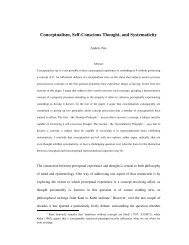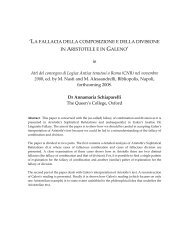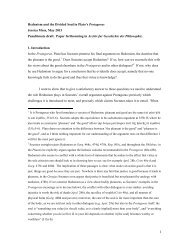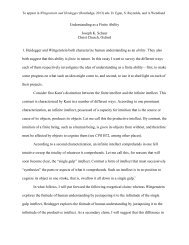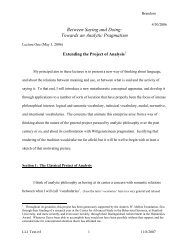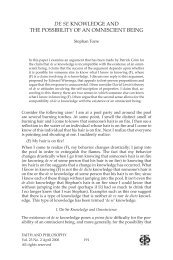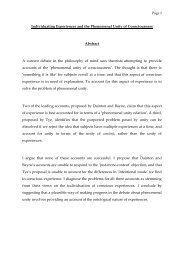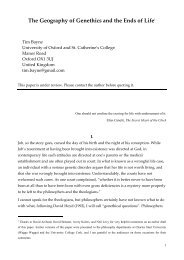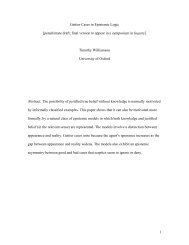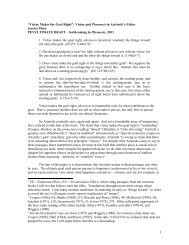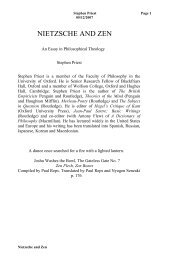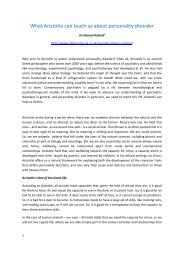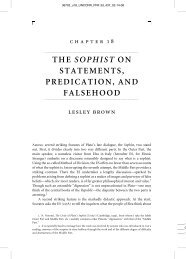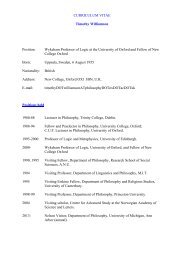Essence and Cause in Plotinus
Essence and Cause in Plotinus
Essence and Cause in Plotinus
You also want an ePaper? Increase the reach of your titles
YUMPU automatically turns print PDFs into web optimized ePapers that Google loves.
ESSENCE AND CAUSE IN PLOTINUS’ ENNEAD VI.7 [38] 2:<br />
AN OUTLINE OF SOME PROBLEMS<br />
Annamaria Schiaparelli<br />
The Queen’s College, Oxford<br />
Introduction<br />
The notions of essence <strong>and</strong> cause are widely discussed <strong>in</strong> philosophy: they are central themes of<br />
philosophical speculation <strong>in</strong> Antiquity as well as nowadays. However, these notions are also<br />
highly problematic: although many attempts have been made, it is still difficult to fully capture<br />
<strong>and</strong> underst<strong>and</strong> them. Furthermore, when one tries to analyse the relation between essence <strong>and</strong><br />
cause, the task becomes even more challeng<strong>in</strong>g.<br />
In Antiquity, the notion of def<strong>in</strong>ition was closely connected to that of essence: at least<br />
from Aristotle onwards, it was generally assumed that the def<strong>in</strong>ition reveals or expresses the<br />
essence.<br />
Given the complexity of these philosophical problems, <strong>in</strong> this paper I shall conf<strong>in</strong>e the<br />
discussion to some aspects of the notions of essence <strong>and</strong> cause (<strong>and</strong> their relation) as they are<br />
presented <strong>in</strong> Plot<strong>in</strong>us’ Ennead VI.7 [38] 2. In some passages of this treatise, Plot<strong>in</strong>us’<br />
philosophical speculation has two aspects: there is an important Platonic background (as one<br />
would normally expect), but Plot<strong>in</strong>us seems also to make use of certa<strong>in</strong> Aristotelian theses about<br />
knowledge of the essence <strong>and</strong> knowledge of the cause. S<strong>in</strong>ce scholars have already explored the<br />
significance of the Platonic background, 1 I shall focus on the <strong>in</strong>fluence of Aristotle’s viewpo<strong>in</strong>t<br />
on Plot<strong>in</strong>us’ discussion. For this reason, some Aristotelian texts will also be presented. My aim<br />
is to br<strong>in</strong>g evidence <strong>in</strong> support of the view that Plot<strong>in</strong>us is <strong>in</strong>terested <strong>in</strong> apply<strong>in</strong>g (at least part<br />
of) the Aristotelian conceptual apparatus <strong>in</strong> his analysis on the causality of Forms.<br />
1. The Platonic background: the causal structure of sensible phenomena<br />
S<strong>in</strong>ce, as I have said, the Platonic background of Plot<strong>in</strong>us’ views on causation has been widely<br />
explored, I shall restrict myself here to a brief outl<strong>in</strong>e of that background.<br />
Some of the ma<strong>in</strong> themes of Plot<strong>in</strong>us’ discussion <strong>in</strong> VI.7 [38] 2 are <strong>in</strong>troduced <strong>in</strong> the<br />
first chapter of the treatise, where Plot<strong>in</strong>us engages himself <strong>in</strong> certa<strong>in</strong> exegetical problems<br />
aris<strong>in</strong>g from Plato’s Timaeus. In VI.7 [38] 1, the start<strong>in</strong>g po<strong>in</strong>t of Plot<strong>in</strong>us’ philosophical<br />
speculation is Plato’s description of the activity of the craftsman (<strong>and</strong> the other gods) when the<br />
world’s body (i.e., the sensible universe) was formed. 2 Plot<strong>in</strong>us is also concerned with the<br />
1 E.g., Hadot [1988], D’Ancona Costa [1992].<br />
2 A detailed reconstruction of the significance <strong>and</strong> the role of the demiurgos <strong>in</strong> the Neoplatonic tradition can<br />
be found <strong>in</strong> O’Meara [1975].<br />
1



